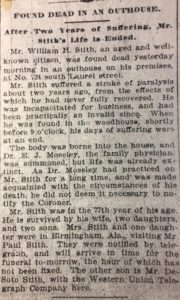Back in the day there was no guard stationed in the lobby of The New & Observer in Raleigh, where I worked as an investigative reporter, and anyone could ride the elevator to the third floor, walk up to your desk, and get a load off his or her mind.
I handled a lot of the walk-in tipsters, including nearly all of the ones who were not playing with a full deck: the ones who had been hexed; the ones who knew where Jimmy Hoffa was buried; the ones with convoluted conspiracy theories.

My objective was always the same, to try to conclude our little meeting without doing anything that would prompt them to lean over my desk and say, ominously: “You’re one of them, aren’t you.”
One day I looked up and there stood a tipster who introduced himself and said he was in the public relations business. He handed me his business card. The card said: Incommunicado, Inc.
[Careful, Pat!]
I listened politely to his tip: the governor of North Carolina and the state director of prisons were distributing cocaine to community college students, hiding it in audio-visual equipment that was moved from campus to campus. He told me he had written a little booklet, a poem, about the governor and his partner in crime which he called HGIELAR. In case that word doesn’t jump right out at you, I’ll tell you: It’s “Raleigh” spelled backwards.
Here is how his poem ended:
“Run Bob, run Lee,
Run from Hgielar and run from me.
Where you gonna run to, where you gonna go?
I just told the world that you run snow.”
NOTE: “Snow,” of course, is street slang for cocaine. Jimmy Hoffa, former president of the International Brotherhood of Teamsters, vanished on July 30, 1975. His body has never been found.
Coming Monday: Whose Side Was I On?
